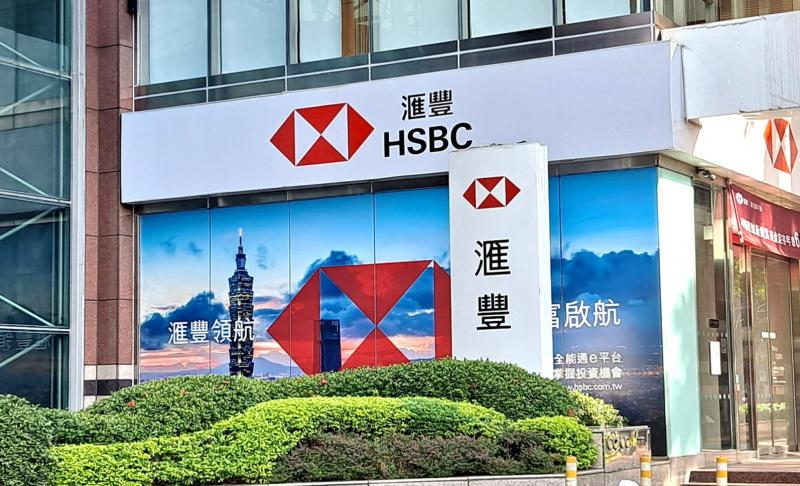HSBC Bank (Taiwan) Ltd (滙豐台灣商銀) yesterday announced that it had become the first foreign bank subsidiary in Taiwan to receive approval from the Financial Supervisory Commission to offer "Wealth 2.0" wealth management services designed for more sophisticated customers, typically with higher net worth.
This approval underscores HSBC’s conviction in Taiwan’s wealth management market and aligns with the government’s initiatives to further develop Taiwan as a financial center in the Asia-Pacific region. It also coincides with HSBC’s 40th anniversary since establishing full-service branches in Taiwan. Looking forward, HSBC will continue to invest in four major areas — platforms and systems, products, flagship wealth centers, and talent development — demonstrating HSBC Group's commitment to Taiwan.

Photo courtesy of HSBC Bank (Taiwan) Ltd
"Taiwan is one of the key markets in HSBC Group’s growth strategy in Asia and is integral to achieving HSBC’s ambition of becoming the leading international wealth manager in the region. As the only wealth management bank in Taiwan with a global network, HSBC Taiwan actively submitted the application for the Wealth 2.0 business, striving to realize our determination to continue investing in the Taiwan market." HSBC Bank (Taiwan) Ltd chairman David Grimme said,
"By adhering to the client-centric concept, HSBC is constantly studying how to offer more professional and sophisticated services to customers. Following approval from the Financial Supervisory Commission to launch the ‘Wealth 2.0’ business, HSBC will further leverage the strength of our international connectivity, continue investing in digital journeys and platforms, open more wealth centers and expand our teams. Through these initiatives, we will become even more competitive in Taiwan’s wealth management market,” HSBC Bank (Taiwan) Ltd president Adam Chen (陳志堅) said,
In recent years, HSBC has continued to invest group resources to develop the Taiwan market. In particular, HSBC Global Private Banking provides Taiwan’s high-net-worth clients with comprehensive and customized asset and liability management, and offers the most efficient management and planning for clients’ global portfolios.
More recently, HSBC Global Private Banking became the first foreign private bank in Taiwan to provide clients with access to mobile and internet banking, and insurance services to support their protection and legacy planning needs. To provide Premier Elite and private banking clients with exclusive and tailor-made wealth management services, HSBC has opened flagship wealth centers in Taipei, Taoyuan and Taichung with plans to open more this year.
As the first foreign bank subsidiary to receive the Wealth 2.0 license, HSBC strives to further expand the market share of high-net-worth clients in Taiwan, increase the scale of assets under management, and provide clients with more holistic, globally connected wealth services and solutions to meet the growing demand.

Taiwan’s exports soared 56 percent year-on-year to an all-time high of US$64.05 billion last month, propelled by surging global demand for artificial intelligence (AI), high-performance computing and cloud service infrastructure, the Ministry of Finance said yesterday. Department of Statistics Director-General Beatrice Tsai (蔡美娜) called the figure an unexpected upside surprise, citing a wave of technology orders from overseas customers alongside the usual year-end shopping season for technology products. Growth is likely to remain strong this month, she said, projecting a 40 percent to 45 percent expansion on an annual basis. The outperformance could prompt the Directorate-General of Budget, Accounting and

Two Chinese chipmakers are attracting strong retail investor demand, buoyed by industry peer Moore Threads Technology Co’s (摩爾線程) stellar debut. The retail portion of MetaX Integrated Circuits (Shanghai) Co’s (上海沐曦) upcoming initial public offering (IPO) was 2,986 times oversubscribed on Friday, according to a filing. Meanwhile, Beijing Onmicro Electronics Co (北京昂瑞微), which makes radio frequency chips, was 2,899 times oversubscribed on Friday, its filing showed. The bids coincided with Moore Threads’ trading debut, which surged 425 percent on Friday after raising 8 billion yuan (US$1.13 billion) on bets that the company could emerge as a viable local competitor to Nvidia

BARRIERS: Gudeng’s chairman said it was unlikely that the US could replicate Taiwan’s science parks in Arizona, given its strict immigration policies and cultural differences Gudeng Precision Industrial Co (家登), which supplies wafer pods to the world’s major semiconductor firms, yesterday said it is in no rush to set up production in the US due to high costs. The company supplies its customers through a warehouse in Arizona jointly operated by TSS Holdings Ltd (德鑫控股), a joint holding of Gudeng and 17 Taiwanese firms in the semiconductor supply chain, including specialty plastic compounds producer Nytex Composites Co (耐特) and automated material handling system supplier Symtek Automation Asia Co (迅得). While the company has long been exploring the feasibility of setting up production in the US to address

OPTION: Uber said it could provide higher pay for batch trips, if incentives for batching is not removed entirely, as the latter would force it to pass on the costs to consumers Uber Technologies Inc yesterday warned that proposed restrictions on batching orders and minimum wages could prompt a NT$20 delivery fee increase in Taiwan, as lower efficiency would drive up costs. Uber CEO Dara Khosrowshahi made the remarks yesterday during his visit to Taiwan. He is on a multileg trip to the region, which includes stops in South Korea and Japan. His visit coincided the release last month of the Ministry of Labor’s draft bill on the delivery sector, which aims to safeguard delivery workers’ rights and improve their welfare. The ministry set the minimum pay for local food delivery drivers at